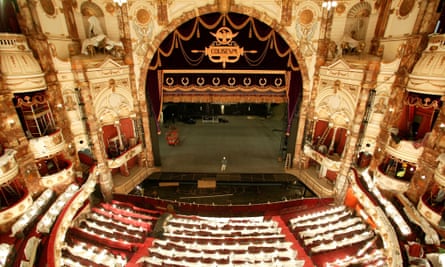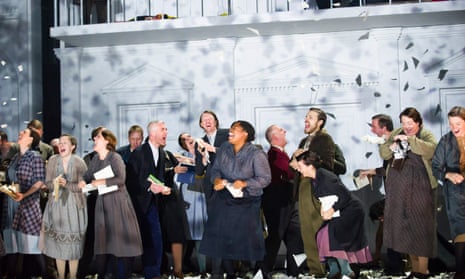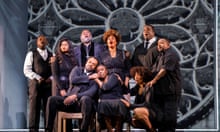As if losing an artistic director, chairman, executive director, a third of its public funding and its place in the national portfolio of arts organisations were not enough, the almost permanently beleaguered English National Opera is beginning 2016 with further dark clouds swirling.
At the end of last year, some of the opera world’s grandest luminaries wrote to the Guardian and the Times warning that proposed efforts to save money would threaten the ENO’s very existence.
He continued: “I don’t think it’s going too far to argue that it would be cultural vandalism to sacrifice ENO’s splendid chorus on the altar of economy. Such radical proposals should be publicly discussed in advance of decision taking.”
Further letters sparked rumours that the ENO would be reducing chorus members’ contracts and presenting a season of only eight operas.
One letter organised by the Royal Opera House’s director of music, Sir Antonio Pappano, said starkly: “Plans to reduce its chorus members’ contracts and limit its productions to eight a season threaten to destroy ENO.”
A further letter signed by 14 people including the conductors Marin Alsop and John Eliot Gardiner said: “Such changes threaten its very existence and we wish to express our opposition to anything that threatens the company of great musicians and singers who are currently giving world-class performances under their music director, Mark Wigglesworth. Without them there is no ENO.”
The Guardian understands the letter writers are correct – the current plan is for as few as eight operas in the next season, due to be announced in April. Contracts with the chorus and orchestra will be renegotiated.
But the company’s management sees that not as a doomsday scenario but as a short-term measure which will enable ENO to properly remodel its business plan following the 2014 decision by Arts Council England to cut the company’s funding by £5m a year.
If the plan is successful, the aspiration would be to have a season of 14 or 15 operas in five years’ time. Crucially they would not all be in its home, the Coliseum, a venue that is both a godsend and curse in that it is a wonderful place to hear opera but it has too many seats – 2,300, which is great for a successful West End musical or popular favourites, less so for innovative, risk-taking opera.

The ENO said: “ENO faces a significant challenge responding to a 30% cut in ACE funding. We are committed to producing world-class opera, sung in English, at the London Coliseum. However, if we do not respond swiftly to the cut in funding, we risk losing an organisation which is at the heart of the artistic community both in the UK and internationally. We cannot and must not let this happen.
“We need to build an organisation that thrives for generations to come; an opera company fit for the 21st century. To do this, and to bridge the gap left by the cut in ACE funding, we will have to make changes to the way our business operates. We are exploring a range of options, including: raising more money from our generous supporters; increasing box office sales and generating more income from the London Coliseum itself – through hospitality and potentially by creating more partnerships with subsidised organisations who perform at the theatre. We are also looking at attracting new audiences by performing work at more venues outside the Coliseum.
“This, in itself, is a huge undertaking. Even by making these changes to ENO’s business, we will have to consider making cost savings – and changing the way we work. We are looking at a range of options, but above all we’re committed to ensure that ENO not only survives but thrives.”
The problems are nothing new for a company that has lurched from one crisis to the next.
In January 2013, it was forced to raid its reserves after it posted losses of almost £2.2m with only 71% of seats filled in 2011-12. Ten years before that it ran a deficit of £1.3m, leading to an emergency rescue plan from the Arts Council. One estimate says ENO has had £33m in public money bailouts over the past 20 years.
It has not been helped by the repeated turmoil at the top of the organisation. In 2005, the then chairman, Martin Smith, resigned, blaming a campaign of “relentless vigour [by] the media together with certain members of the arts community”. He added that it was a campaign that “provided a continuously unpleasant and unhelpful background to our efforts to rebuild ENO”.
Last January, the latest feud at the top of ENO burst into the open after Martyn Rose resigned as chairman. A leaked letter from Rose revealed he saw the company’s artistic director John Berry as “the problem not the solution” and claimed that £10m had been lost on his watch.
He wrote: “For the very survival of the ENO, Berry must leave, preferably soon. Let me be clear – John is, in my mind, the problem not the solution, and no meaningful change will ever take place whilst he remains. Time is of the essence. We cannot wait any longer.”
Weeks later, Henriette Götz, the company’s executive director, resigned. The chaos led to ACE removing ENO from the national portfolio, essentially putting the opera company into special measures.
The concerns were twofold – governance and business model – and the ACE move was effectively ENO’s last chance.
Berry resigned as artistic director in July and has yet to be replaced. A month later, Cressida Pollock, a 33-year-old former McKinsey management consultant, was confirmed as chief executive on a three-year contract after a spell as interim chief executive.
Pollock has talked of a five-year plan to operate in a situation where public money represents 35% of its income rather than the previous 50%, and that inevitably means cuts.
It will also continue with the strategy of staging money-generating musicals in partnership with impresarios Michael Grade and Michael Linnit, and open up the Coliseum as a place people can go for a drink or food at any time.
Another problem for the ENO to address is its perceived lack of friends in high places. Its relationship with its main funder, ACE, has been rocky to say the least. Peter Bazalgette, a former chairman of ENO, is now chairman of ACE, but excuses himself from discussions because of the obvious conflict of interest.
The recent appointment of Morgan Stanley’s head of European financial services research, Huw van Steenis, to the board is an interesting one. The ENO needs more access to the pockets of city financiers, but it is also striking that van Steenis’s wife is Camilla Cavendish, an Oxford contemporary of David Cameron and head of the policy unit at No 10.
Although ENO says the speculation is just that and that no firm decisions have been made, the mood music coming out of the company is that the loss of £5m a year ACE funding means cuts are inevitable.
“We have to take drastic action even to stand still, it is not just about raising more money,” said one insider.
The feeling is that the company needs to sort its business model out now because there will be no bailouts in the future.
Wigglesworth, the company’s respected music director, has made it plain that he could not work with a part-time company. “There is no such thing,” he told the Sunday Times. “That’s a contradiction in terms. A company is people playing together, singing together, working together, in a building they know, all the time, delivering work that is vastly more than the sum of its parts.”
The offstage turmoil comes as, artistically, the ENO is on a high. The Guardian’s Andrew Clements gave four stars to the the ENO’s last production, Verdi’s The Force of Destiny, and praised “Wigglesworth’s highly energised approach ... orchestrally and chorally the performance is high-class”.
The New York Times critic agreed. “[Wigglesworth’s] mastery of the score was total, and his leadership clearly inspiring from the way the orchestra and chorus played and sang. The opera has been through bad times during the past six months in terms of money, management and morale. But from a show as bold and confident as this, one would never know.”
Burton said he had a lot of sympathy for ENO’s financial situation. “I think a great deal should be done to get rich people to dig into their pockets and bail them out while we wait for a government to have a more sensible view about what great big opera houses need to keep them going. They are not an ornament, they are part of the cultural life of big cities and two opera houses in London is not excessive.”











Comments (…)
Sign in or create your Guardian account to join the discussion